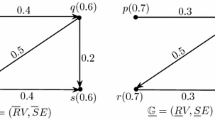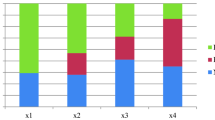Abstract
This paper aims to develop a novel conflict resolution model using decision-theoretic fuzzy rough set to handle more complex real scenarios by allowing decision-makers to express their opinions more freely on a scale from −1 to 1. Further, many algorithms are developed to handle change in information systems, and detailed experimental analysis is done to validate the proposed model’s efficiency and practicality.




Similar content being viewed by others
Explore related subjects
Discover the latest articles, news and stories from top researchers in related subjects.References
Agarwal RP, Baleanu D, Nieto JJ, Torres DFM, Zhou Y (2018) A survey on fuzzy fractional differential and optimal control nonlocal evolution equations. J Comput Appl Math 339:3–29
Alkaim AF, Janabi SA (2019) Multi objectives optimization to gas flaring reduction from oil production. Big Data Netw Technol 81:117–139. https://doi.org/10.1007/978-3-030-23672-4-10
Bashir Z, Mahnaz S, Malik MGA (2021) Conflict resolution using game theory and rough sets. Int J Intel Syst 36:237–259
Chen H, Li T, Ruan D, Lin J, Hu C (2011) A rough-set based incremental approach for updating approximations under dynamic maintenance environments. IEEE Trans Knowl Data Eng 25(2):174–184
Chen D, Yang Y, Dong Z (2016) An incremental algorithm for attribute reduction with variable precision rough sets. Appl Soft Comput 45:129–149
De Silva LGO, De Almeida-Filho ATL (2016) A multicriteria approach for analysis of conflicts in evidence theory. Inf Sci 346:275–285
Deja Z (2002) Conflict analysis. Int J Intel Syst 17:235–253
Feng T, Mi JS (2016) Variable precision multigranulation decision-theoretic fuzzy rough sets. Knowledge-Based Syst 91:93–101
Hu BQ (2014) Three-way decisions space and three-way decisions. Inf Sci 281:21–52
Hu J, Pedrycz W, Wang G, Wang K (2016) Rough sets in distributed decision information systems. Knowledge-Based Syst 94:13–22
Janabi SA, Alkaim AF, (2021) A comparative analysis of DNA protein synthesis for solving optimization problems: a novel nature-inspired algorithm. In: A. Abraham, H. Sasaki, R. Rios, N. Gandhi, U. Singh, K. Ma (Eds.), Innovations in Bio-Inspired Computing and Applications. IBICA, (2020) Advances in intelligent systems and computing, 1372. Springer, Cham
Janabi SA, Alkaim AF (2020) A nifty collaborative analysis to predicting a novel tool (DRFLLS) for missing values estimation. Soft Comput 24(1):555–569. https://doi.org/10.1007/s00500-019-03972-x
Janabi SA, Rawat S, Patel A, Shourbaji IA (2015) Design and evaluation of a hybrid system for detection and prediction of faults in electrical transformers. Int J Electr Power Energy Syst 67:324–335. https://doi.org/10.1016/j.ijepes.2014.12.005
Janabi SA, Alkaim AF, Adel Z (2020) An Innovative synthesis of deep learning techniques (DCapsNet & DCOM) for generation electrical renewable energy from wind energy. Soft Comput 24:10943–10962. https://doi.org/10.1007/s00500-020-04905-9
Janabi SA, Mohammad M, Al-Sultan A (2020) A new method for prediction of air pollution based on intelligent computation. Soft Comput 24(1):661–680. https://doi.org/10.1007/s00500-019-04495-1
Janabi SA, Alkaim A, Janabi EA, Aljeboree A, Mustafa M (2021) Intelligent forecaster of concentrations (PM2.5, PM10, NO2, CO, O3, SO2) caused air pollution (IFCsAP). Neural Comput Appl. https://doi.org/10.1007/s00521-021-06067-7
Jianpinga Y, Hong-Zhonga H, Qianga M, Rui S (2011) A novel information fusion method based on dempster-shafer evidence theory for conflict resolution. Intel Data Anal 15:399–411
Kadhum G, Janabi SA (2021) Design Guide Prediction Model for the Legal Interactions (GPM-LI), in: A. Abraham, T. Hanne, O. Castillo, N. Gandhi, Rios T. Nogueira, T. P. Hong (Eds.), Hybrid Intelligent Systems. HIS 2020. Advances in Intelligent Systems and Computing, 1375, Springer, Cham https://doi.org/10.1007/978-3-030-73050-5-4
Lang G, Li Q, Cai M, Yang T (2015) Characteristic matrixes-based knowledge reduction in dynamic covering decision information systems. Knowledge-Based Syst 85:1–26
Lang G, Miao D, Yang T, Cai M (2016) Knowledge reduction of dynamic covering decision information systems when varying covering cardinalities. Inf Sci 346–347:236–260
Lang G, Miao D, Cai M (2017) Three-way decision approaches to conflict analysis using decision-theoretic rough set theory. Inf Sci 406–407:185–207
Lang G, Luo J, Yao Y (2020) Three-way conflict analysis: a unification of models based on rough sets and formal concept analysis. Knowledge-Based Syst 194:105556
Lang G, Miao D, Fujita H (2020) Three-way group conflict analysis based on pythagorean fuzzy set theory. IEEE Trans Fuzzy Syst 28(3):447–461
Li H, Zhou X (2011) Risk decision making based on decision-theoretic rough set: a three-way view decision model. Int J Comput Intel Syst 4:1–11
Li J, Huang C, Qi J, Qian Y, Liu W (2017) Three-way concept learning via multi-granularity. Inf Sci 378:244–263
Li X, Wang X, Lang G, Yi H (2021) Conflict analysis based on three-way decision for triangular fuzzy information systems. Int J Approx Reason 132:88–106
Liang D, Liu D, Pedrycz W, Hu P (2013) Triangular fuzzy decision-theoretic rough sets. Int J Approx Reason 54:1087–1106
Liang J, Wang F, Dang C, Qian Y (2014) A group incremental approach to feature selection applying rough set technique. IEEE Trans Knowl Data Eng 26(2):294–308
Liang D, Pedrycz W, Liu D, Hu P (2015) Three-way decisions based on decision-theoretic rough sets under linguistic assessment with the aid of group decision making. Appl Soft Comput 29:256–269
Liu Y, Lin Y (2015) Intuitionistic fuzzy rough set model based on conflict distance and applications. Appl Soft Comput 31:266–273
Liu D, Liang D, Wang C (2016) A novel three-way decision model based on incomplete information system. Knowledge-Based Syst 91:32–45
Luo C, Li T, Chen H, Lu L (2015) Fast algorithms for computing rough approximations in set-valued decision systems while updating criteria values. Inf Sci 299:221–242
Pawlak Z (1984) On conflicts. Int J Man-Machine Stud 21(2):127–134
Pawlak Z (1998) An inquiry into anatomy of conflicts. Inf Sci 109:65–68
Pawlak Z (2005) Some remarks on conflict analysis. Eur J Op Res 166(3):649–654
Qian Y, Zhang H, Sang Y, Liang J (2014) Multigranulation decision-theoretic rough sets. Int J Approx Reason 55(1):225–237
Radzikowskaa AM, Kerre EE (2002) A comparative study of Fuzzy rough sets. Fuzzy Sets Syst 126:137–155
Raza MS, Qamar U (2016) An incremental dependency calculation technique for feature selection using rough sets. Inf Sci 343:41–65
Shu W, Shen H (2014) Incremental feature selection based on rough set in dynamic incomplete data. Pattern Recognit 47(12):3890–3906
Sun B, Ma W, Zhao H (2016) Rough set-based conflict analysis model and method over two universes. Inf Sci 372:111–125
Sun B, Chen X, Zhang L, Ma W (2020) Three-way decision making approach to conflict analysis and resolution using probabilistic rough set over two universes. Inf Sci 507:809–822
Sutoyo E, Mungad M, Hamid S, Herawan T (2016) An efficient soft set-based approach for conflict analysis. Plos One 11(2):e0148837
Varmaghani A, Nazar AM, Ahmadi M, Sharifi A, Ghoushchi SJ, Pourasad Y (2021) DMTC: Optimize energy consumption in dynamic wireless sensor network based on fog computing and fuzzy multiple attribute decision-making. Wirel Commun Mob Comput. https://doi.org/10.1155/2021/9953416
Yang X, Yao JT (2012) Modelling multi-agent three-way decisions with decision-theoretic rough sets. Fundam Inform 115:157–171
Yang X, Qi Y, Yu H, Song X, Yang J (2014) Updating multigranulation rough approximations with increasing of granular structures. Knowledge-Based Syst 64:59–69
Yao Y (2010) Three-way decisions with probabilistic rough sets. Inf Sci 180(3):341–353
Yao Y (2011) The superiority of three-way decisions in probabilistic rough set models. Inf Sci 181(6):1080–1096
Yu C, Yang J, Yang D, Ma X, Min H (2015) An improved conflicting evidence combination approach based on a new supporting probability distance. Expert Syst Appl 42(12):5139–5149
Zhang J, Li T, Ruan D, Liu D (2012) Neighborhood rough sets for dynamic data mining. Int J Intel Syst 27(4):317–342
Zhi H, Qi J, Qian T, Ren R (2020) Conflict analysis under one-vote veto based on approximate three-way concept lattice. Inf Sci 516:316–330
Acknowledgements
The authors are grateful to the editor and anonymous reviewers for their valuable suggestions which helped us to improve this manuscript greatly.
Author information
Authors and Affiliations
Ethics declarations
Conflict of interest
All authors have no conflict of interest.
Ethical approval
This article does not contain any studies with animals performed by any of the authors.
Informed consent
Informed consent was obtained from all individual participants included in the study.
Additional information
Publisher's Note
Springer Nature remains neutral with regard to jurisdictional claims in published maps and institutional affiliations.
Rights and permissions
About this article
Cite this article
Bashir, Z., Wahab, A. & Rashid, T. Three-way decision with conflict analysis approach in the framework of fuzzy set theory. Soft Comput 26, 309–326 (2022). https://doi.org/10.1007/s00500-021-06509-3
Accepted:
Published:
Issue Date:
DOI: https://doi.org/10.1007/s00500-021-06509-3




